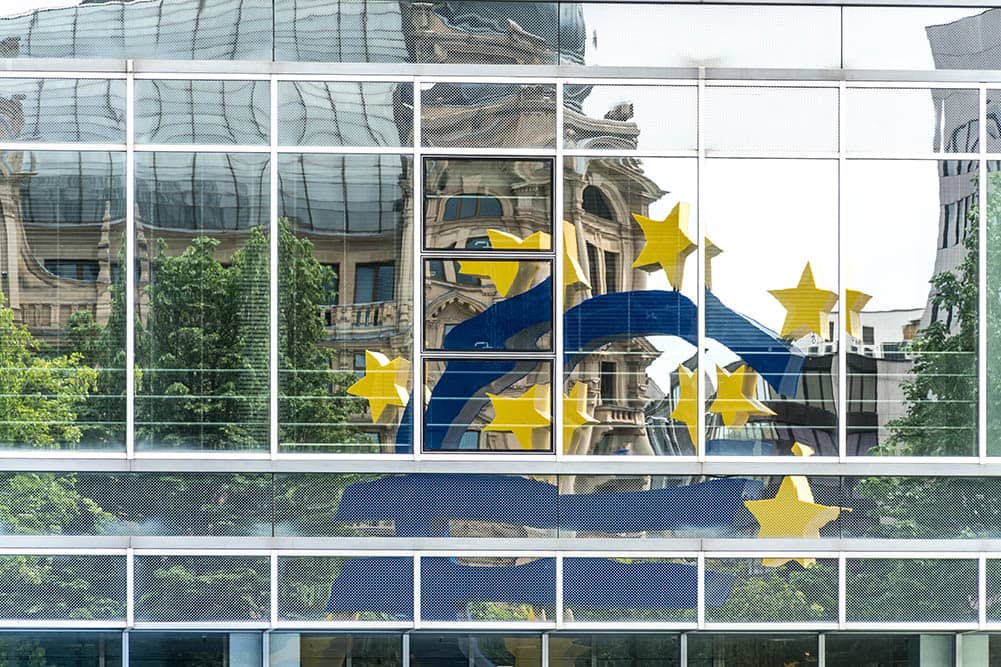GBP/EUR: Cheap
- Written by: Gary Howes

Image © Adobe Images
The Pound to Euro exchange rate has risen ahead of the European Central Bank's March interest rate decision, with analysts saying it looks cheap.
Researchers at one French investment bank say 'fair value' for the Pound to Euro exchange rate is located just above 1.17, an observation that could see it maintain an upside bias.
"The EUR is starting to look overvalued across the board. This is the result of the recent drop of the currency’s short-term fair value on the back of persistent erosion of the EUR’s rate appeal across the board as well as widening peripheral yield spread to Bund," says Valentin Marinov, Head of G10 FX Strategy at Crédit Agricole.
According to Marinov, "EUR/GBP and EUR/NOK look expensive relative to their fair values of 0.8535 and 11.414 respectively".
EUR/GBP fair valuation at 0.8535 puts the equivalent Pound to Euro fair value at 1.1715.
Compare Currency Exchange Rates
Find out how much you could save on your international transfer
Estimated saving compared to high street banks:
£2,500.00
Free • No obligation • Takes 2 minutes
We reported yesterday that analysts at ING Bank said the Euro appears overvalued relative to interest rate differentials between the Eurozone and elsewhere.
"At these levels, EUR/USD looks expensive," says Francesco Pesole, FX Strategist at ING. "The good performance of equities is largely to be blamed".
Interest rate differentials between the Eurozone, the UK, and the U.S. are typically the major drivers of Euro-Dollar and Euro-Pound; they reflect investor expectations for future changes in interest rates at the respective central banks.
Above: GBP/EUR at daily intervals. Track GBP/EUR with your own custom rate alerts. Set Up Here
The Pound-Euro rate's rally back to 1.1670 takes it back into the middle of the January-April trading range, as we predicted in our Week Ahead forecast, published Monday.
Whether it can extend to 1.17 and above depends on the ECB's Thursday policy decision, where interest rates are expected to be left unchanged. Market participants will be keen to hear the central bank's guidance regarding an expected June rate cut and whether further cuts over the remainder of 2024 might be forthcoming.
"The EUR downside risks could intensify ahead of the April ECB policy meeting on Thursday where President Christine Lagarde could preannounce the start of the ECB easing cycle in June and, potentially, well ahead of the Fed and other central banks," says Marinov.
ECB President Lagarde will likely verify market expectations for a June rate cut while warning further cuts are entirely data-dependent.
This should generate enough doubt to keep the Euro sellers at bay and potentially push Pound-Euro lower.
But should she encourage markets to 'price in' further rate cuts with greater confidence, the Euro can come under pressure on the day.
Above: ECB interest rates are at their most restrictive in years, with some economists saying a cut should be delivered this week. Image: Julius Baer.
Risks to the Euro include a surprise rate cut, which some investment bank economists say is now needed.
"There are very few convincing reasons why the European Central Bank could not cut interest rates immediately, as lower inflation continues to drive real rates higher," says David Kohl, an analyst at Julius Baer.
Julius Baer says falling inflation and a flat central bank policy rate means real rates in the Eurozone have risen from 0% in September 2023 (when it last raised rates) to 1.6% in March.
"We see a good chance that the ECB will surprise with a rate cut this week," says Kohl. For the Euro, a surprise rate cut this week would trigger significant weakness.
Economists at ABN AMRO say the ECB will cut in June, and that the real question for markets is what happens beyond.
"A lot of the attention is now actually about the path beyond June. Investors are basically 50-50 on whether a June cut will be followed by a July move and market pricing suggest that the ECB will pause at least at one meeting after the cycle begins," says Nick Kounis, an economist at ABN AMRO.
"Our own base case is that the ECB will cut policy rates at each and every meeting from June onwards," he adds.
This would mean the market would need to lower its interest rate expectations, which we would expect to weigh on Euro exchange rates, all else equal.






